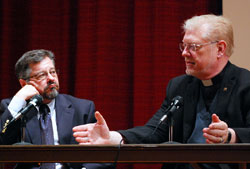Priest and rabbi hope film discussion leads to greater interfaith dialogue

Rabbi Aaron Spiegel, left, and Father Rick Ginther participate in a discussion on April 30 at Christian Theological Seminary in Indianapolis following a viewing of the French movie, The Jewish Cardinal, which was a feature of this year’s Indianapolis Jewish Film Festival. (Submitted photo)
By Sean Gallagher
Fifty years ago, the Catholic bishops participating in the Second Vatican Council approved “Nostra Aetate,” a declaration on the Church’s relation to non-Christian religions.
In the following half century, meetings between St. John Paul II, Pope Benedict XVI and Pope Francis and representatives of other faith traditions, especially Jewish leaders, have highlighted the effect this document has had on the Church.
A recent dialogue at the Indianapolis Jewish Film Festival demonstrated how discussions between Jews and Catholics on matters of faith can take place at the local level.
On April 30, an audience of approximately 70 people representing various Jewish and Christian traditions gathered at Christian Theological Seminary in Indianapolis to view the French movie, The Jewish Cardinal.
It tells the story of the late Cardinal Jean-Marie Lustiger, who served as archbishop of Paris from 1983-2005. Cardinal Lustiger, who was born in Paris in 1926 to Jewish parents of Polish origin, was baptized as a Catholic when he was 13.
During World War II, his mother was deported to the Auschwitz-Birkenau concentration camp and died there in 1943.
A 2007 New York Times obituary for Cardinal Lustiger emphasized how he understood himself as a “Jewish Christian” throughout his life after his baptism, and how he promoted interfaith dialogue for decades, serving as an important adviser on such discussions for St. John Paul.
A discussion after the movie was led by Father Rick Ginther, director of the archdiocesan Office of Ecumenism, and Rabbi Aaron Spiegel, resources consultant for the Indianapolis-based Center for Congregations.
“Some of the folks who were there gained a greater insight into the fact that the Church really is making great efforts [at interfaith dialogue], that the Church itself struggles to deal with history,” said Father Ginther, who is also dean of the Terre Haute Deanery and pastor of St. Patrick and St. Margaret Mary parishes, both in Terre Haute.
Rabbi Spiegel acknowledged in an interview with The Criterion that many Jews have difficulty with the way that Cardinal Lustiger identified himself as a Jewish Catholic and that, therefore his role in the discussion was “to help the Jewish people in the audience see that, regardless of how we feel about Lustiger personally and the decisions he made, he did some amazing things.”
Included among those amazing things was the way in which Cardinal Lustiger helped St. John Paul be a leader in moving the Polish people to acknowledge the specifically Jewish nature of the atrocities that occurred at Auschwitz.
“I don’t think [St. John Paul] would have moved for acknowledgement of that if it weren’t for Lustiger,” Rabbi Spiegel said. “That was huge. I can’t express how big a deal that was.”
He said having Jews and Christians view together a movie such as The Jewish Cardinal, and then discuss it together is a way for them to move beyond difficult interfaith relations of the past and wondering why they occurred.
“Right now is much more important than yesterday,” Rabbi Spiegel said. “So, we can keep working on the why and we can figure it out. But let’s not get stuck there. Let’s move forward to today, making it work today and making it work for tomorrow.”
Father Ginther said the dialogue was a good way to explore the “shared history” of Jews and Catholics, something he noted that more Catholics need to recognize.
“It benefits the Church to acknowledge that shared history,” he said. “There are enough people out there who don’t want to admit that there’s a shared history [and] that we need to speak that truth on a consistent basis.”
Speaking that truth and continuing in dialogue with the Jewish community is something that Rabbi Spiegel hopes will foster something greater than tolerance between Catholics and Jews.
“Just to tolerate somebody is not enough,” he said. “We don’t have to like each other. And we don’t have to agree.
“But it’s more than tolerating the other. It’s acknowledging as full dialogue partners and full partners in the human condition. That’s what I felt like [was affirmed] in my conversation with Father Rick.”
Father Ginther said that the discussion that took place at the Indianapolis Jewish Film Festival was a small beginning to what he hopes will be a deepened Catholic-Jewish dialogue at the local level in the future.
“I don’t know how that’s going to be,” Father Ginther said. “But that would be my hope. We’re doing baby steps right now.” †
